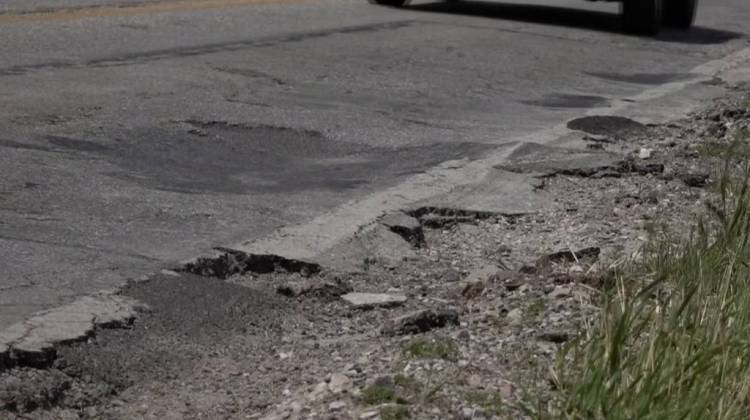The Indiana General Assembly wraps up the first half of its session: the House passes the state budget, the Senate shackles the governor over emergency powers and elimination of Indiana’s handgun licenses is a step closer.
Here’s what you might have missed this week at the Statehouse.
Biennial Budget
House Republicans tout in their budget $378 million in new spending for K-12 education – about a third of which will go to private school vouchers – and grants for small business recovery, student learning loss, law enforcement and regional economic development.
Democrats say the budget doesn’t do enough for working Hoosiers – lamenting the GOP’s rejection of all of the Dems’ proposals, including more money for food banks, women- and minority-owned businesses and pre-K.
Governor Emergency Powers
Legislation that cleared the Senate would restrict the governor from declaring a widespread public emergency for longer than 60 days. The measure is a response to lawmakers’ unhappiness with many of the governor’s COVID-19 executive orders.
READ MORE: How Do I Follow Indiana's Legislative Session? Here's Your Guide To Demystify The Process
Join the conversation and sign up for the Indiana Two-Way. Text "Indiana" to 73224. Your comments and questions in response to our weekly text help us find the answers you need on COVID-19 and other statewide issues.
Eliminating Handgun Public Carry Licenses
And the House advanced a bill to eliminate the state’s license requirement to carry a handgun in public. It also orders the state to create a system for frontline police officers to quickly identify anyone who’s not allowed to carry in a bid to placate law enforcement agencies opposed to the bill. But such a system might not be legally possible.
House Speaker Todd Huston Pledges Steps Forward After Racial Tensions
Indiana House Speaker Todd Huston (R-Fishers) said his chamber needs to take steps forward after the “step backward” last week that culminated with lawmakers having to be physically separated from each other.
Black Democratic lawmakers were booed and heckled by some Republicans after raising concerns about what they saw as discrimination in a piece of legislation.
Huston said he’s “embarrassed” by what happened.
Indiana Legislative Black Caucus Calls For Reprimand Of House Lawmakers, Implicit Bias Training
The Indiana Black Legislative Caucus isn’t satisfied with the response to last week’s incidents in the House that culminated with lawmakers having to be physically separated from each other.
IBLC Chair Robin Shackleford (D-Indianapolis) said there should be reprimands for all involved – but that they don’t need to be punitive.
“We have to acknowledge and also address what happened," Shackleford said. "We can’t just sweep it under the rug and continue to move forward.”
Abortion Reversal Bill
Indiana will add more hurdles for people seeking abortions under legislation approved by the House Monday.
Rep. Peggy Mayfield’s (R-Martinsville) bill does several things. For one, it requires notarization of the parental consent form for abortions, required for anyone under 18. Rep. Sue Errington (D-Muncie) criticized that provision. She said it's not about safety, but about "erecting one more barrier to a legal abortion."
Mayfield said her bill would also now require providers print out and give the pregnant person the ultrasound image before the abortion.
Experts, Organizers Weigh In On 'Rioting' Bill
Indiana lawmakers want to increase penalties for some protests – including those that may cause property damage. Critics say this is just the most recent punitive measure aimed at Black Lives Matter protesters, and Indiana isn’t the only state with this kind of legislation.
More than 100 businesses across downtown Indianapolis, Fort Wayne and Lafayette were damaged after largely peaceful Black Lives Matter protests escalated into clashes with police the last weekend of May.
Senate Bill 198 is a response to those protests. The bill does a number of things – among them: it creates a new crime, conspiracy to commit rioting. It raises the penalties for violating curfews and rioting – if there’s more than $750 worth of damage or if someone is seriously injured. It also prohibits a person arrested during an "unlawful assembly" from being released on bail without a hearing in open court.
And it allows for civil forfeiture of property that is used to “finance a crime committed” by an unlawful assembly, which critics are concerned would extend to medical supplies and water bottles.
Prosecutor Override Bill
The Indiana attorney general and special prosecutors would be empowered to take over cases that local prosecutors won’t charge under legislation narrowly approved by the Senate Tuesday.
The measure would allow the attorney general to get a special prosecutor appointed if local prosecutors say they categorically won’t charge people for certain crimes. The local county would then be charged for that special prosecutor.
Indiana Senate Democrats On ‘Missed Opportunities’ In First Half
Indiana Senate Democrats say Republicans haven’t focused on helping working Hoosiers in the first half of the 2021 session.
GOP leaders tout COVID-19 liability protections for businesses – already signed into law– as a major accomplishment of the session’s opening two months. There are also multiple bills to rein in the governor’s emergency powers. And new spending for small business recovery, learning loss and law enforcement reform.
But Senate Minority Leader Greg Taylor (D-Indianapolis) said there are too many missed opportunities.
 DONATE
DONATE







 Support WFYI. We can't do it without you.
Support WFYI. We can't do it without you.